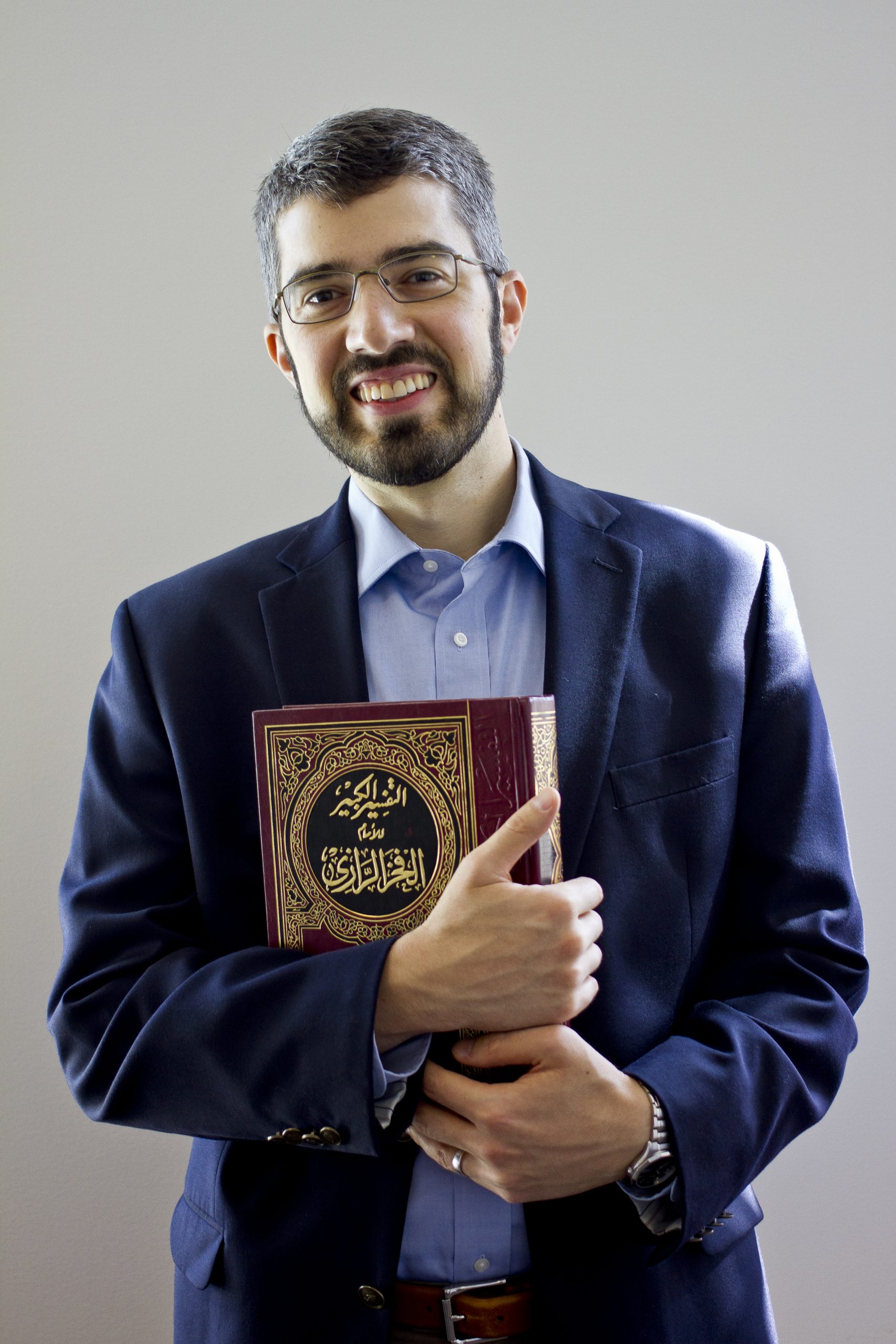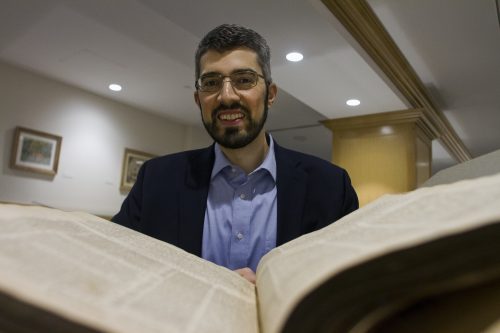Muslim Scholars and the Biblical Text
Samuel Ross studies the evolution of Quran commentaries throughout history.

Samuel Ross studies how Quran commentators have drawn on the Bible. Photo by Mark Graham
Muslim Scholars and the Biblical Text
Samuel Ross studies the evolution of Quran commentaries throughout history.
The Quran, the sacred text of Islam, is a compilation of God’s revelations as proclaimed by the Prophet Muhammad between 610 and 632. Muslims study this scripture with the aid of Quran commentaries, which explain and interpret the text, verse by verse. The first commentaries were written by the eighth century, and Muslim scholars continue to produce them today.
Commentaries help readers understand the Quran, a challenging text that does not always provide a situational or historical context for Muhammad’s declarations. Samuel Ross, assistant professor of religion, said the works have additional value: Because commentators often reference ideas from law, science and philosophy, scholars can compare commentaries from different times to discover how Islamic perspectives evolved. “These commentaries are like an archive of Islamic thought,” he said.
Ross is specifically interested in how, when and why Muslims have used the Bible to interpret the Quran.
Ross is specifically interested in how, when and why Muslims have used the Bible to interpret the Quran.
The Quran mentions prophets such as Moses, David and Jesus as well as biblical narratives like the Israelites’ escape from Egypt. But such stories are abridged accounts that don’t always provide historical context. Ross said this is because the Quran presupposes its original audience — seventh-century residents of the Arabian Peninsula — was familiar with those stories. For readers in later generations and in other parts of the world, a commentary might fill in the gaps.
Ross said Islamic studies scholars know that some Quran commentators cited the Bible, but he wanted to get a clearer picture of how frequently the references happened and at what historical moments. His answers could shed light on how Muslims related to Christians and Jews throughout history.
Ross searched the text of 153 digitized Quran commentaries for biblical terms. The results showed that Quran commentators — with rare exceptions — did not incorporate such context until the late 19th century. Then, suddenly, commentators from all over the Muslim world began referencing the Bible.
His discovery raised new questions: Why didn’t commentators reference the Bible earlier? What happened in the late 1800s to spark the change?
Ross found that although the Bible was translated into Arabic as early as the eighth century, Muslims had difficulty accessing Arabic versions until the 12th century. By then, Islam had become the dominant religion in the regions of the world where commentators were working, among them Spain, the Middle East and Central Asia. Ross posited that in the absence of regular contact with Jews or Christians, Muslims may have been less curious about the Bible.
But the 19th-century expansion of British and French colonial power into the Arab world was accompanied by an influx of Christian missionaries who brought millions of Arabic-language Bibles and established schools that many Muslims attended.
Reading the Bible, Ross said, changed how Muslims understood the Quran. He identified passages that commentators began explaining differently once they had access to the Bibles.

Samuel Ross’ manuscript, The Biblical Turn in the Qur’an Commentary Tradition, won the 2019 BRAIS — De Gruyter Prize in the Study of Islam and the Muslim World. Photo by Mark Graham
“You’ll find examples of commentators who, when faced with an apparent contradiction between the Quran and the biblical text … worked to harmonize the two texts together,” he said, “which suggests that they’re treating the Bible charitably and therefore giving it a degree of authority.”
Ross explained these ideas in The Biblical Turn in the Qur’an Commentary Tradition, a manuscript based on his dissertation at Yale University. The work won the 2019 BRAIS – De Gruyter Prize in the Study of Islam and the Muslim World.
Each prize entry was reviewed by a panel of Islamic studies scholars as well as an additional expert in that contestant’s subfield. For Ross’ manuscript, that reviewer was Walid Saleh, a Quran commentary scholar and professor of religion at the University of Toronto.
Until Ross’ analysis, Saleh said, no one had attempted a comprehensive study that examined how Muslims used the Bible in Quran commentary.
“He has given us a summation and a trajectory that was not there before,” Saleh said, “and it gives us a better understanding of how we narrate this history.”
Editor’s note: Samuel Ross and writer Robyn Ross are not related.

Your comments are welcome
5 Comments
Really helpful information.You provide the good information about the Quran that increases the my Quranic knowledge.Your detail explanation remove my some confusions.
Bro keep it up.
Allah accept your hard work in raising the islam.
Great work Mr Ross, I’m a Christian woman. I try very hard to understand people’s religion. I have been reading about the Muslims plus their Quran and how the refer to the Bible as well. I have many friends and co-worker who are Jewish and Muslim. You Sr have shed light in my own personal study. Thank you so much and continue your great work.
very interesting viewpoint…in Judaism they also have their commentaries to help interpret the law.Jesus came to save them from their sins but also to interpret the law correctly since the religious leaders had misinterpreted in that they had strayed from the spirit of the law that God had intended.
Great work. It would be great if Islamic scholars would do their own independent research and let the world know about their findings. It is remarkable how Christianity has able to do that.
Mumtaz Yusuf
mumtazyusuf@hotmail.com
What do you understand about Genesis 2:18
Related reading:
Research + Discovery
Ideas of Terrorism Transfer to Latin American Immigrants
A sociologist finds the unease affects U.S. views and laws.
Campus News: Alma Matters, Research + Discovery
Aminah McCloud – Islam in America
Green Chair lecturer bridges the wisdom of the founding fathers and 21st Century Islam
Features
Warrior for Peace
Nobel laureate Leymah Gbowee mobilized women to demand an end to Liberia’s second civil war.